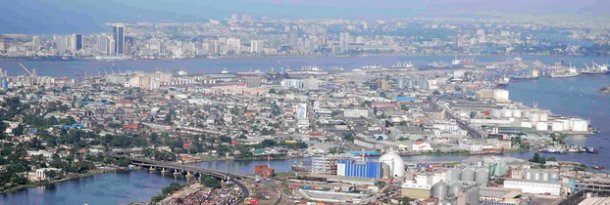Lagos City Profile NigeriaTags: Lagos Profile, Lagos City Profile, Lagos Economic Profile, Lagos Daily Life Profile, Lagos Social Profile, Lagos Video Profile |
|
Lagos' social profile reflects the fact the city's cultural fabric of Lagos is as rich and diverse as its population. As a melting pot of over 250 ethnic groups from across Nigeria and West Africa, the city vibrates with a unique blend of traditions, languages, and artistic expressions. Music is an undeniable force, with Lagos being the birthplace and epicentre of Afrobeats, a genre that has taken the global music scene by storm. The city's clubs, lounges, and live music venues pulse with energy, offering a taste of its vibrant nightlife. For visitors, Lagos has a number of attractions worth visiting, with art galleries, fashion houses, and design studios mushrooming, showcasing the immense creative talent of Lagosians. Particularly worth a look are the Black Heritage Museum, which explores 300 years of the slave trade through Lagos, and the Lekki Conservation Centre, some twenty minutes from Lagos, with its raised walkway through a jungle environment from where many species of wild animals can be observed. Also worth a look are the Didi Museum, the Nike Art Gallery and the National Theatre of Arts & Culture, whilst those seeking to relax will enjoy time on the beaches at Eleko, Lekki and Tarkwa. |
Lagos Profile |
Lagos Profile |
Lagos Profile | Lagos Profile |
|

|
To speak of Lagos is to speak of a city alive, a sprawling megapolis that pulses with an unparalleled energy, serving as Nigeria's economic heartbeat and West Africa's vibrant commercial nerve centre. Far more than just a geographical location, Lagos is an experience – a complex tapestry woven from bustling markets, gleaming skyscrapers, a thriving arts scene, and the sheer, indomitable spirit of its millions of inhabitants. The city's culinary scene is equally diverse, ranging from exquisite fine dining establishments to popular street food vendors offering local delicacies like suya (spiced grilled meat), akara (bean fritters), and a variety of swallow dishes with rich soups. Every corner of Lagos offers a sensory feast, a testament to its dynamic cultural synthesis. While Lagos offers immense opportunities, it is also a city grappling with formidable challenges typical of rapidly expanding megacities. Traffic congestion, notoriously known as "go-slow," is legendary, often turning short commutes into hours-long journeys. Infrastructure strains, issues of waste management, housing deficits, and the need for sustainable urban planning are constant concerns. The city's low-lying coastal areas also make it vulnerable to flooding. However, the resilience and entrepreneurial spirit of Lagosians are equally legendary. The city is a hotbed of innovation, with its youthful population constantly finding creative solutions to everyday problems. Government initiatives and private sector investments are continually working to address infrastructure gaps, evidenced by ongoing projects like the Lagos Blue Line Metro and various road networks aimed at improving connectivity. The vision for Lagos is not just about managing growth but transforming into a truly smart, sustainable, and globally competitive city. The Lagosian day often begins before dawn. For many, especially those who navigate the city's notorious traffic, waking hours start as early as 4:00 AM or 5:00 AM. The first sounds are often the distant hum of generators kicking to life, the melodic call to prayer from a nearby mosque, or the faint throb of a church service. Homes stir with activity: children preparing for school, parents getting ready for work, and the aroma of morning tea or a quick breakfast like ogi (pap) and akara (bean cakes) filling the air. Central to this morning ritual is the commute. Lagos's infrastructure, while continually developing, struggles to keep pace with its exploding population. This results in the infamous "go-slow" – a euphemism for the city's crippling traffic jams that can turn a 30-minute journey into a multi-hour ordeal. Public transportation is dominated by the bright yellow danfos (mini-buses), sardine-packed and driven by conductors who ingeniously shout out their destinations amidst the cacophony. For shorter distances and a faster, albeit riskier, option, motorcycle taxis (known as okada) weave through impossible gaps, creating a dizzying ballet of speed and agility. Many also rely on ride-hailing apps, which have become increasingly popular for their convenience, despite the traffic. Once the commute is conquered, the true Lagosian hustle begins. The city is a hive of economic activity, fueled by an entrepreneurial spirit that permeates every street. From corporate high-rises in Victoria Island and Ikoyi, where professionals navigate boardrooms and international deals, to the bustling markets of Balogun and Tejuosho, where traders skillfully hawk everything imaginable, work in Lagos is diverse and demanding. The informal economy thrives, with roadside vendors selling snacks, phone accessories, and even art, turning sidewalks into dynamic marketplaces. Everyone, it seems, is on a mission to make a living, showcasing an admirable drive that powers the city forward. Meals in Lagos are more than mere sustenance; they are a vital part of the social and cultural fabric. Lunchtime often sees office workers patronising local bukas (informal eateries) for hearty plates of jollof rice, eba with egusi soup, or amala and ewedu. Street food is omnipresent and irresistible: crispy akara, fluffy puff-puff, succulent suya (spicy grilled meat), and freshly squeezed fruit juices are readily available. Dinner is often a family affair, a time to reconnect and share stories of the day, with traditional dishes served in communal settings. However, daily life in Lagos is not without its significant challenges. Infrastructure issues are a constant reality. Power fluctuations are common, meaning many homes and businesses rely on generators, whose persistent hum adds to the city's ambient noise. Water supply can be inconsistent, and managing waste is an ongoing battle. The sheer density of population, coupled with the pressure to succeed, can also lead to high stress levels and a constant feeling of urgency. Yet, it is precisely in the face of these challenges that the remarkable resilience of Lagosians shines brightest. There is an unflappable spirit, a "can-do" attitude that enables residents to adapt, innovate, and find solutions where others might despair. From small businesses running entirely on generator power to individuals finding alternative routes through traffic, Lagosians are masters of improvisation and perseverance. The community spirit is strong, with neighbours often assisting one another, and social gatherings – from impromptu street parties to elaborate weddings and religious ceremonies – serving as vital outlets for connection and celebration. As dusk settles over Lagos, the city transforms but never truly sleeps. Traffic might thin slightly, but the streets remain alive. Food vendors prepare for the evening rush, bars and restaurants fill up, and the sounds of music drift from entertainment spots. Many head to religious services, while others enjoy time with friends and family. Evenings are a time for reflection, socialising, and preparing for the dynamic cycle that will inevitably begin again with the rising sun. Daily life in Lagos is an intricate tapestry woven with threads of relentless energy, spirited ambition, and an astonishing capacity for resilience. It's a city that demands much from its inhabitants but gives back in spades through its vibrant culture, entrepreneurial opportunities, and the indomitable spirit of its people. To experience Lagos is to be immersed in this fascinating, demanding, and ultimately unforgettable daily rhythm. |








